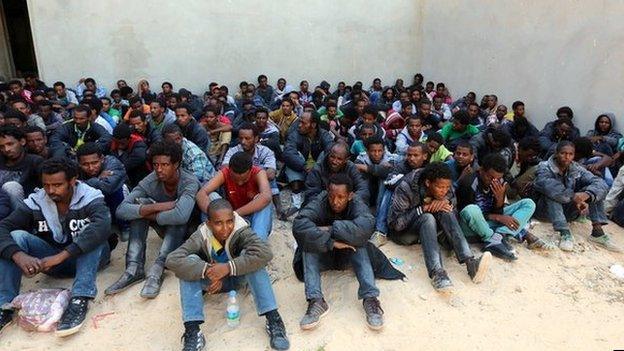Mediterranean migrants crisis: Is military force the solution?
- Published
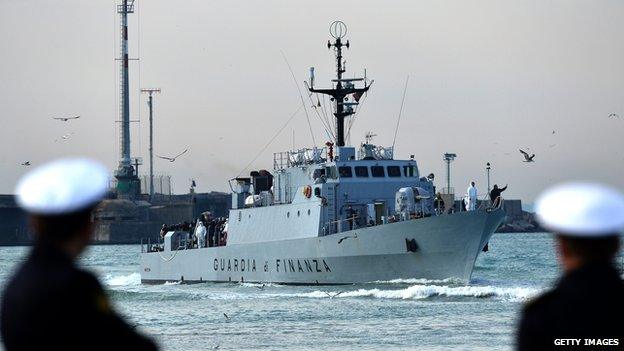
Calls have mounted for a military response to the Mediterranean migrant crisis
European leaders are scrambling to find a way to stem the flow of migrants across the Mediterranean, after a large spike in deaths drew public condemnation.
EU foreign and defence ministers have agreed on plans for military action, including efforts to destroy the boats used by people-smugglers operating in Libya.
They are now seeking a UN Security Council resolution that would give the EU a legal basis for using military force against smuggling networks.
But would military action really work - and if not, what would?

Destroy the boats
EU foreign policy chief Federica Mogherini has said destroying smugglers' boats would enable EU countries to destruct the lucrative business models of the networks.
Admiral Lord West, former head of the UK's Royal Navy, has described the proposals to destroy the boats as "difficult but achievable".
"I think we should try... to come to some agreement with [the Libyan authorities] so that we can send boats back into a harbour, and have some way of disabling them, or disable them at sea and send the people back into shore," he told the BBC.
The European Commission has previously suggested, external the EU's tactics should be inspired by the "positive results" obtained by Operation Atalanta, external, the EU's anti-piracy mission off the coast of Somalia.
But Gerry Northwood, Atalanta's former head of operations, says destroying boats would have "limited value".
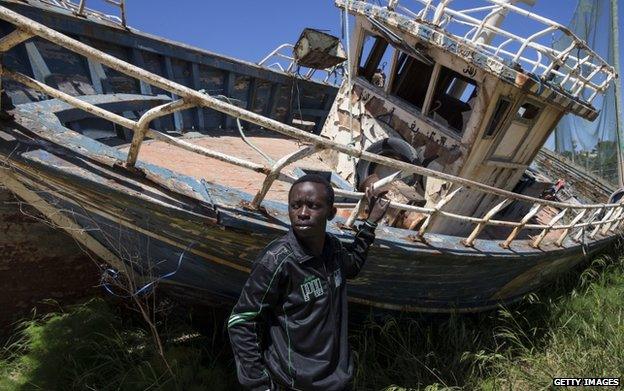
A migrant from Nigeria stands in a "boat graveyard" in Lampedusa, Italy
Boats are "cheap and plentiful" and easily replaced, he told the BBC.
He also warned this approach could result in unwanted loss of life.
Hans Lucht, writer and senior researcher at the Danish Institute for International Studies, says it may be a challenge to convince some countries - especially Russia - to agree to a UN military mandate.
And authorities in Libya, where central government collapse and the rise of Islamic State militants have caused chaos, have objected to the EU's proposals.
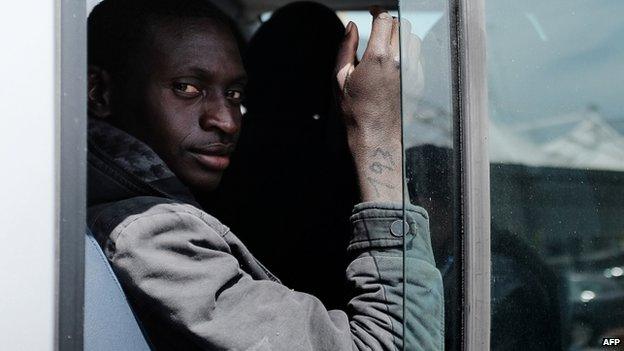
A rescued migrant arrives in the Sicilian harbour of Catania
Meanwhile Mr Lucht adds that destroying the boats would not necessary stop trafficking networks, which have "become widespread and have strong local and ethnic ties".
"You can't just expect to hit one or two smuggling operations and then the whole thing goes away."

Send them back
In April, Australian PM Tony Abbott urged Europe to follow his country's lead, saying: "The only way you can stop the deaths is, in fact, to stop the boats."
Australia detains all asylum seekers who arrive by boat, holding them in offshore processing camps.
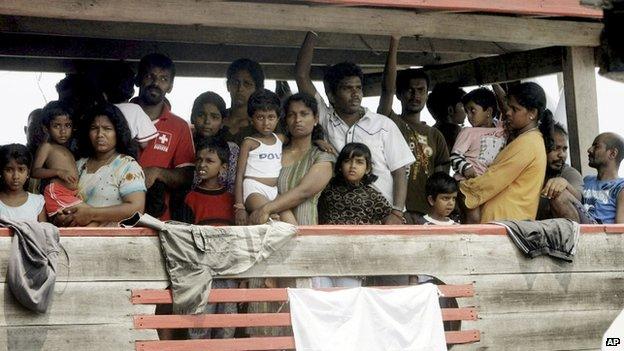
Sri Lankan migrants bound for Australia remain on their boat after being intercepted by the Indonesian navy
Military vessels also intercept migrant boats, towing them back to the country they came from, or sending asylum seekers back in dinghies or lifeboats.
Australia's approach has been hailed by some European politicians, but criticised by rights groups and the UN.
Paul Barrett, a former secretary of Australia's defence department, told the UK's Guardian newspaper, external that returning vessels to Libya was very different from turning them back to countries such as Indonesia.
"If you turn around boats that are fleeing from Libya and send them straight back to Libya you're injecting them straight back into the danger that they've fled," he said.
Any operation would be obliged to observe the international legal principle of "non-refoulement" - meaning that people fleeing conflict or persecution are not sent back to a life-threatening place.
Could Australia's tough approach to migrants work in Europe?

Boost naval patrols
The EU's naval force, with a headquarters in Rome, will have the aim of tackling people-smugglers operating from Libya.
Several EU member states pledged additional resources for naval patrols at a summit in Brussels in April.
Leaders also said they would give extra funding to search and rescue operations - although rights groups said they had not gone far enough.
Gerry Northwood says countries will need to co-operate with each other, as well as with the commercial shipping sector, to be successful.
"There is value in these patrols, in terms of maintaining law and order on the high seas," he said.
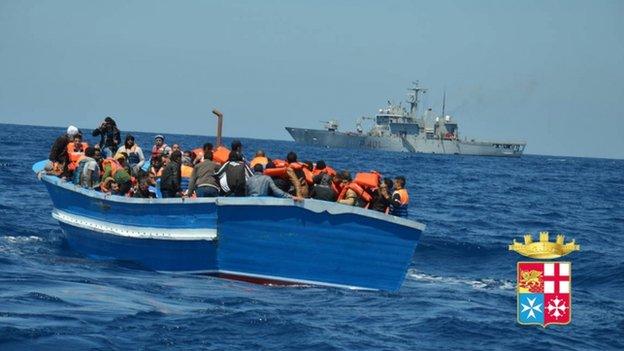
Italy's Mare Nostrum rescue patrol ended last year after EU leaders said they could not afford it
However, the only real solution to the problem is to improve conditions ashore, while ensuring the criminal networks "do not have any targets", he added.
For pirates off the Somali coast, this means protecting vulnerable ships. But in the Mediterranean it means working to stop the flow of migrants.
"Anything you do at sea is effectively a sticking plaster," he said.
"Until you actually stop the migrants coming off, or being able to come off in the first place, you are limited in the degree to which you can solve this problem."

Let them in
The European Council President, Donald Tusk, has said: "We will step up efforts to address conflict and instability as key push factors of migration."
Meanwhile the increasing death toll in the Mediterranean - 1,800 migrants are believed to have died making the crossing so far this year - has boosted calls for countries to let more migrants in.
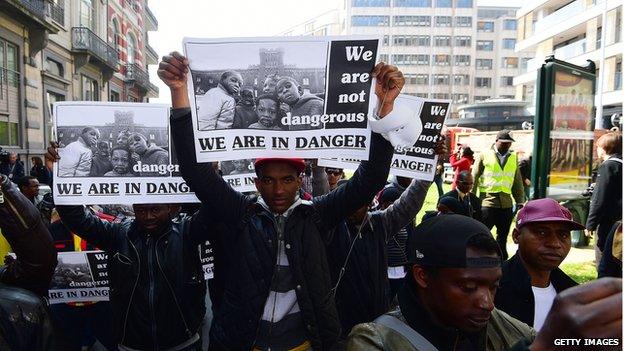
Activists and migrants protest outside the European Council in Brussels
The European Commission has unveiled a controversial plan for national quotas to relocate many migrants who have reached Europe.
Some experts believe countries should do more to facilitate legal migration.
"The root cause of people getting on rickety boats or paying smugglers in the first place is that they have been legally barred from travelling by any other means," says John Lee from the action group Open Borders.
"If EU countries let these people buy a plane ticket in the first place, you wouldn't have the sort of deadly chaos we're seeing now in the Mediterranean."
- Published23 April 2015
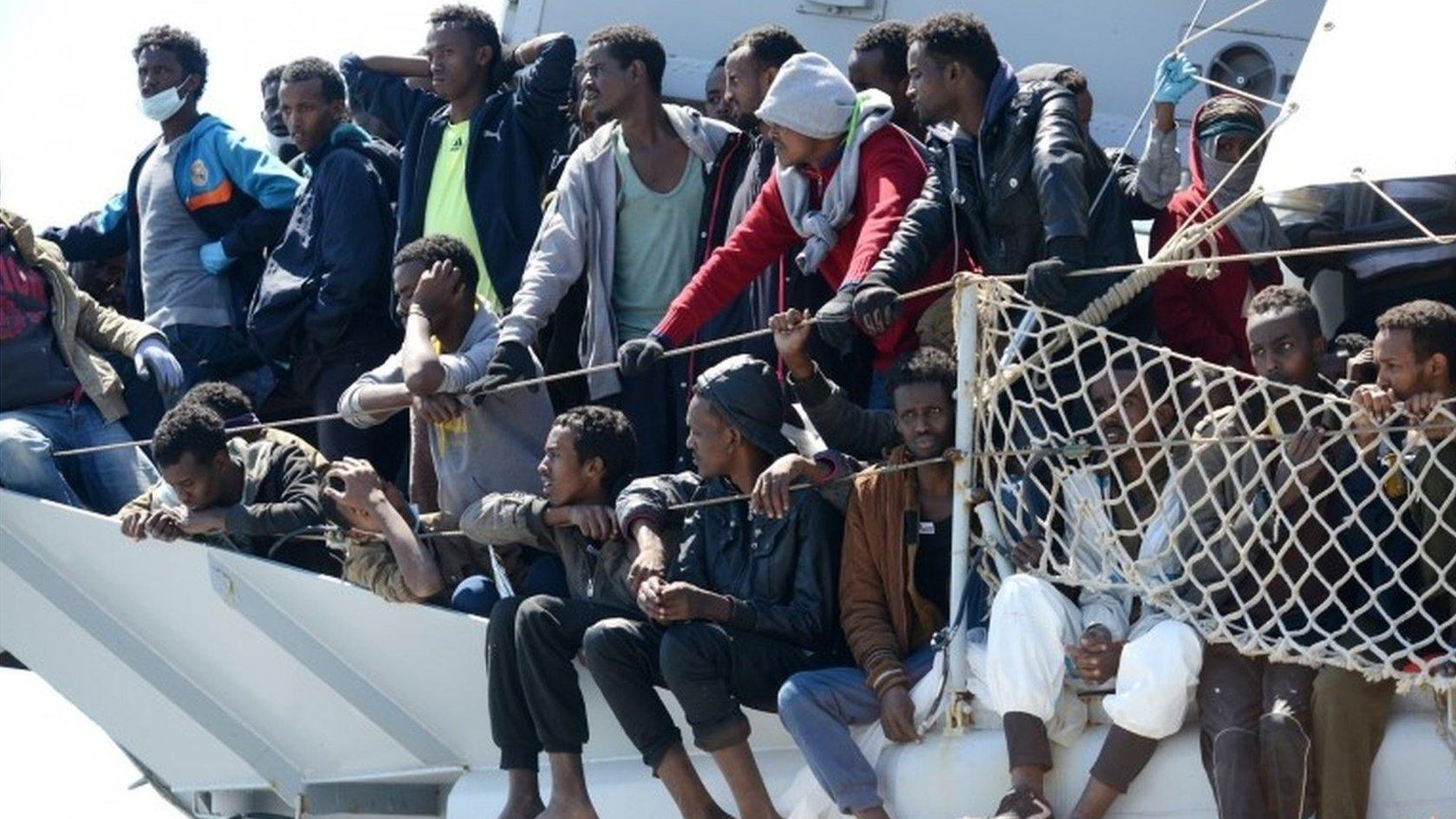
- Published23 April 2015
- Published23 April 2015
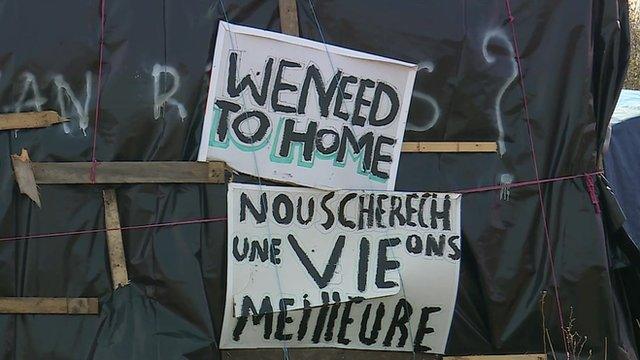
- Published23 April 2015
